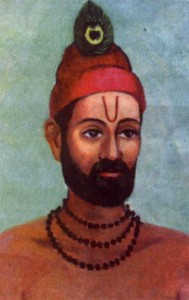 Poet and mystic Kabir lived between 1440 and 1518 in India and has had a great influence on Indian society, and beyond, ever since. He was an intensely spiritual man, taking concepts from both Hinduism and Islam to present a world view that reduces man’s place in the universe to its simplest components. His poetry feeds from this well of simplicity and has, for several hundred years, led to his enduring appeal amongst an Indian populace from all walks of life.
Poet and mystic Kabir lived between 1440 and 1518 in India and has had a great influence on Indian society, and beyond, ever since. He was an intensely spiritual man, taking concepts from both Hinduism and Islam to present a world view that reduces man’s place in the universe to its simplest components. His poetry feeds from this well of simplicity and has, for several hundred years, led to his enduring appeal amongst an Indian populace from all walks of life.
His own life is shrouded in mystery and legend. Of his birth it has been said that he was either the son of a Brahman widow or that he came from a virgin birth. What we do know is that Kabir was never formally educated and grew up illiterate, an astounding fact for someone who has had such an effect on the Indian psyche and the world of poetry even up to the present day. Early on in life he became a disciple of the Hindu ascetic Ramananda despite being a Muslim by birth himself.
As he grew older, Kabir shunned the complexity of both Hindu and Islamic philosophies, opting instead to explore the Sahaja or simple path and his greatest work is the Bijak (the Seedling) which explores the concept of the fundamental one.
Kabir’s poetry is characterised by a down-to-earth prose particularly for the time in which it was written. Largely spiritual in nature, his original work was expressed orally in the Hindu vernacular that often began with an insult or absurdity to grab the listener’s attention.

Kabir’s enduring power is seen in the reverence he is held by many Hindus, Muslims, and Sikhs alike and his works stand as a bridge between the three religions. He lived a normal life, was a father with children and worked for a living, shunning the life of a mystic as it was perceived to be in those days.
He was essentially a weaver by trade and a singer-poet by nature, and his philosophy greatly influenced the growth and development of Sikhism. His revolutionary ideas didn’t come without consequence at the time, however, and some less enlightened religious leaders resented it and this ultimately led to his banishment from Varanasi at the age of 60.
Living in exile he travelled across India with a group of disciples until his death in 1518.

Kabir was a master at expressing the world’s spiritual needs in a few lines or dohas. Throughout his hundreds of longer works there is a grounding in the normal world, taking everyday situations and making them more meaningful in a social and spiritual context.
The fact that his poetry was originally produced through an oral tradition of singing or reciting means that, when they were finally written down, the poems may have suffered somewhat in translation, both from memory and through different dialects.
Today, his work is read across the globe, has been alluded to in many Bollywood films and has even been turned back into music again, as with Indian Ocean’s rendering of ‘The Intricately Woven Blanket’, one of Kabir’s most famous poems.

